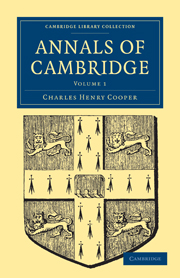Book contents
- Frontmatter
- Contents
- FABULOUS HISTORY
- THE BRITONS AND ROMANS
- THE SAXONS AND DANES
- WILLIAM THE CONQUEROR
- WILLIAM RUFUS
- HENRY THE FIRST
- STEPHEN
- HENRY THE SECOND
- RICHARD THE FIRST
- JOHN
- HENRY THE THIRD
- EDWARD THE FIRST
- EDWARD THE SECOND
- EDWARD THE THIRD
- RICHARD THE SECOND
- HENRY THE FOURTH
- HENRY THE FIFTH
- HENRY THE SIXTH
- EDWARD THE FOURTH
- HENRY THE SIXTH RESTORED
- EDWARD THE FOURTH RESTORED
- EDWARD THE FIFTH
- RICHARD THE THIRD
- HENRY THE SEVENTH
- HENRY THE EIGHTH
EDWARD THE FIRST
Published online by Cambridge University Press: 29 August 2010
- Frontmatter
- Contents
- FABULOUS HISTORY
- THE BRITONS AND ROMANS
- THE SAXONS AND DANES
- WILLIAM THE CONQUEROR
- WILLIAM RUFUS
- HENRY THE FIRST
- STEPHEN
- HENRY THE SECOND
- RICHARD THE FIRST
- JOHN
- HENRY THE THIRD
- EDWARD THE FIRST
- EDWARD THE SECOND
- EDWARD THE THIRD
- RICHARD THE SECOND
- HENRY THE FOURTH
- HENRY THE FIFTH
- HENRY THE SIXTH
- EDWARD THE FOURTH
- HENRY THE SIXTH RESTORED
- EDWARD THE FOURTH RESTORED
- EDWARD THE FIFTH
- RICHARD THE THIRD
- HENRY THE SEVENTH
- HENRY THE EIGHTH
Summary
1273.
The University had been accustomed to ring the bell of the church of St. Benedict, to convene clerks to extraordinary lectures. Alan, the rector of that church, however, denied them this privilege, and much strife ensued between him and the Chancellor and University on this account. At length, however, by the intervention of Hugh de Balsham, Bishop of Ely, a composition was effected between the parties, the rector consenting for ever to permit the bell to be rung in a civil and honest way, as it had theretofore been accustomed to be done, so as the clerk of the church were satisfied for such ringing in the usual manner. This composition was sealed by the bishop, and bears date at Shelford, on Wednesday next after the Sunday on which “letare Jerusalem” is sung, 1273.
At or before this time the Friars of St. Mary settled in Cambridge. Seventeen years afterwards they built a house in Catton Rewe, near the church of All Saints, by the Castle. This order appears to have been suppressed in 1307.
1274.
On the Saturday next after the feast of St. Lucy, an inquisition was taken in St. Andrew's church before the Archdeacon of Ely, respecting the custom of the town of Cambridge as to the tithe of milk, wool, and lambs, by the Dean of Cambridge, the rector of St. Benedict's, the vicars of St. Edward, St. John, and the Holy Trinity, the rectors of St. Michael and St. Mary, the vicars of St. Clement, St. Botolph, All Saints near the hospital, St. Andrew, St. Peter, and All Saints beyond the bridge, and by certain laymen in the presence of the master and brethren of St. John's hospital.
- Type
- Chapter
- Information
- Annals of Cambridge , pp. 54 - 71Publisher: Cambridge University PressPrint publication year: 2009First published in: 1845



